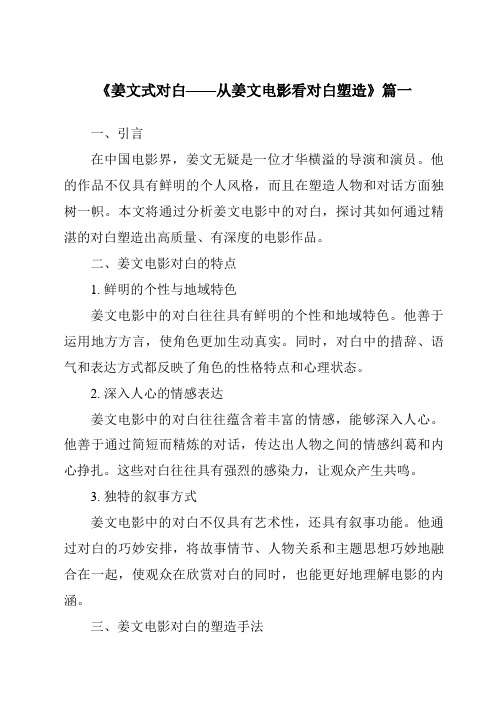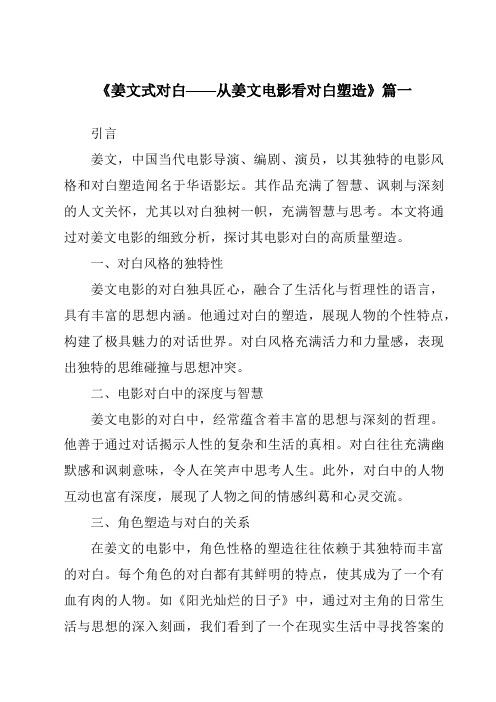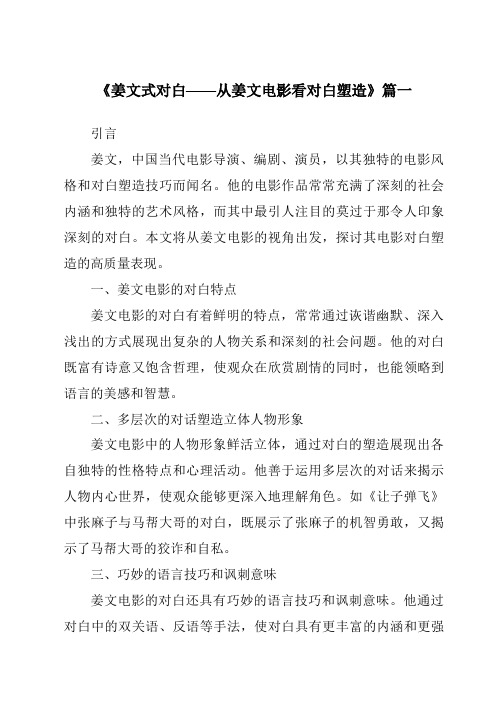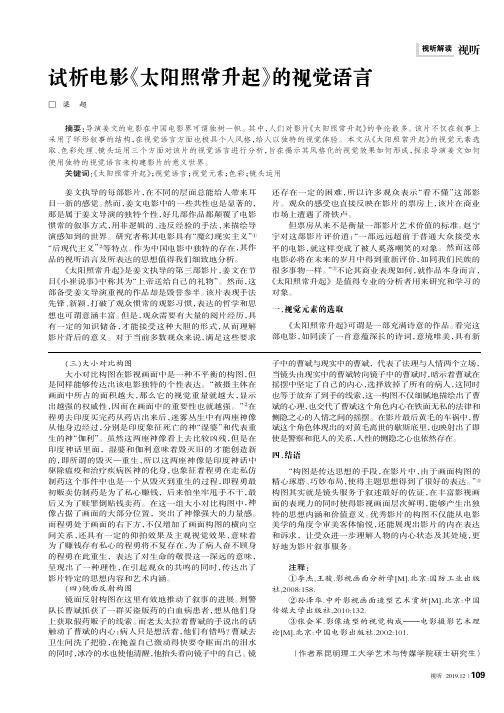姜文 电影英文赏析
浅析经典电影《太阳照常升起》

浅析经典电影《太阳照常升起》作者:杜兴华来源:《今传媒》2015年第12期摘 ;要:任何艺术形式的创造,实质上都是一种语言的创造,语言与作者所处的文化背景是分不开的。
所以一门艺术的研究,首先应当是一种艺术语言学的研究。
电影,作为世界第七大艺术,对其语言的研究得到了广泛的关注。
作为第六代个性导演,姜文将电影语言发挥的淋漓尽致,本文以姜文经典电影《太阳照常升起》一片为例,用电影语言分析其电影中的各种个性化的表达。
关键词:《太阳照常升起》;电影语言;电影艺术中图分类号:J905 ; ; ; ; ; ;文献标识码:A ; ; ; ; ; ;文章编号:1672-8122(2015)12-0100-02一、电影语言:一种隐含的情感表达方式在麦茨的《电影:语言或者语言活动》中指出一个观点:电影是一个没有“语言”但却包含着“言语”的“语言活动”。
在电影语言中有无数的离散单元,但从标准语言学上讲,电影中找不到类似于音调、语素、字词这类基本的离散性单元成分,所以说每部电影都有其自己独特的语言存在[1]。
姜文自己曾经说的,人类的一切情感表达都是一厢情愿的。
例如,你对心爱的对象的情感表达,你对一件事物的追求。
而姜文导演自己也在这条路上畅通无阻的欢乐的阔步向前着。
笔者窃以为此观点非常正确。
任何一部电影都只是导演的电影而已。
一提到姜文的电影,大家都会觉得这是电影,但为什么感觉离我们很远。
从影片《阳光灿烂的日子》到电影《鬼子来了》一直到这部《太阳照常升起》。
姜文一直在通过自己的方式表达所理解的“人”。
二、电影叙事:非传统的叙事方式现代电影语言学开创者克里斯丁麦茨的电影语言研究首先是以电影叙事分析的面目出现的,说明电影与文学的研究在语言表述的方式上联系起来了。
正如麦茨所言:电影是一种会讲故事的机器。
姜文经典电影《太阳照常升起》,导演的高明之处首先表现在其故事打破了平时观众习以为常的线性叙事方式。
影片将四个看似无关其实十分紧密相联的故事顺序打乱。
《2024年姜文式对白——从姜文电影看对白塑造》范文

《姜文式对白——从姜文电影看对白塑造》篇一一、引言在中国电影界,姜文无疑是一位才华横溢的导演和演员。
他的作品不仅具有鲜明的个人风格,而且在塑造人物和对话方面独树一帜。
本文将通过分析姜文电影中的对白,探讨其如何通过精湛的对白塑造出高质量、有深度的电影作品。
二、姜文电影对白的特点1. 鲜明的个性与地域特色姜文电影中的对白往往具有鲜明的个性和地域特色。
他善于运用地方方言,使角色更加生动真实。
同时,对白中的措辞、语气和表达方式都反映了角色的性格特点和心理状态。
2. 深入人心的情感表达姜文电影中的对白往往蕴含着丰富的情感,能够深入人心。
他善于通过简短而精炼的对话,传达出人物之间的情感纠葛和内心挣扎。
这些对白往往具有强烈的感染力,让观众产生共鸣。
3. 独特的叙事方式姜文电影中的对白不仅具有艺术性,还具有叙事功能。
他通过对白的巧妙安排,将故事情节、人物关系和主题思想巧妙地融合在一起,使观众在欣赏对白的同时,也能更好地理解电影的内涵。
三、姜文电影对白的塑造手法1. 精炼而富有张力姜文电影中的对白往往言简意赅,每个字、每个词都经过精心挑选和安排。
这种精炼的对白不仅能让观众更容易理解故事,还能让角色之间的交流更加紧凑有力。
2. 运用讽刺与幽默姜文电影中的对白常常运用讽刺和幽默的手法,以轻松的方式揭示社会的丑恶现象和人性的弱点。
这种讽刺和幽默让观众在欢笑中思考,增强了电影的感染力。
3. 注重人物关系的塑造姜文电影中的对白非常注重人物关系的塑造。
他通过对白中的言语交锋、情感流露和心理暗示,将人物之间的关系展现得淋漓尽致。
这些对白不仅让观众更好地理解角色的性格和心理,还能让观众更好地把握故事的发展。
四、案例分析以姜文导演的《让子弹飞》为例,该片中的对白堪称经典。
影片中张麻子与黄四郎之间的对话,不仅充满了讽刺与幽默,还深刻地揭示了社会现象和人性的弱点。
通过这些对白,观众可以更深入地了解角色的性格和心理,以及故事背后的主题思想。
姜文电影的文学性分析

姜文电影的文学性分析姜文是中国电影导演、编剧和演员,在中国电影界享有很高的声誉。
他的电影作品以其独特的风格和深刻的主题而闻名,其中不乏文学性极高的作品。
本文将对姜文电影的文学性进行分析。
首先,姜文电影的剧情与文学作品类似,具有情节引人入胜、角色鲜明等特点。
姜文的电影常常以具有戏剧性冲突的故事为背景,如《让子弹飞》中黑社会老大和贪官的斗智斗勇,以及《阳光灿烂的日子》中的爱情与背叛。
他的影片通常充满悬疑、反讽和意外的情节转折,令观众充满期待和紧张。
同时,姜文电影中的角色形象生动鲜明,他们有着独特的性格和命运,深入人心。
这些剧情和角色的刻画都展现了姜文对于生活的洞察和思考,体现出他扎实的文学功底。
其次,姜文电影中的对话和台词也是其文学性的重要体现之一、姜文善于运用幽默、讽刺和反转的手法,通过对话展示人性的复杂和社会的现实。
他的台词经常精炼而诙谐,能够给观众带来更多的思考和情感上的共鸣。
例如,《让子弹飞》中的“给我抄出来,我朋友圈里没几个有勇气!”以及《一步之遥》中的“人都不知道自己什么时候死,这才是最大的悬疑!”都成为了观众茶余饭后的谈资。
此外,姜文的电影还常常借助文学作品或文化符号来丰富电影的内涵。
例如,《阳光灿烂的日子》中引用了鲁迅的《故乡》,体现了对历史的回顾和思考;《鬼子来了》中则展现了中国抗日战争时期的爱情和革命,抒发了对国家和民族的热爱之情。
这些文学与历史的交织,使影片更有深度和思考的空间。
最后,姜文电影中的意象和美学呈现也是其文学性的重要组成部分。
姜文擅长用镜头语言和艺术手法来表达情感和主题,如《让子弹飞》中的刀光剑影,以及《阳光灿烂的日子》中的夕阳和雨水等。
他的影片常常注重画面的美感,追求各个元素之间的和谐与统一、这些图像的表达,使得姜文电影更具诗意和情感张力。
综上所述,姜文电影的文学性体现在多个方面,如剧情与角色的刻画、对话与台词的运用、文学作品与文化符号的引用,以及意象与美学的表现等。
《2024年姜文式对白——从姜文电影看对白塑造》范文

《姜文式对白——从姜文电影看对白塑造》篇一引言姜文,中国当代电影导演、编剧、演员,以其独特的电影风格和对白塑造闻名于华语影坛。
其作品充满了智慧、讽刺与深刻的人文关怀,尤其以对白独树一帜,充满智慧与思考。
本文将通过对姜文电影的细致分析,探讨其电影对白的高质量塑造。
一、对白风格的独特性姜文电影的对白独具匠心,融合了生活化与哲理性的语言,具有丰富的思想内涵。
他通过对白的塑造,展现人物的个性特点,构建了极具魅力的对话世界。
对白风格充满活力和力量感,表现出独特的思维碰撞与思想冲突。
二、电影对白中的深度与智慧姜文电影的对白中,经常蕴含着丰富的思想与深刻的哲理。
他善于通过对话揭示人性的复杂和生活的真相。
对白往往充满幽默感和讽刺意味,令人在笑声中思考人生。
此外,对白中的人物互动也富有深度,展现了人物之间的情感纠葛和心灵交流。
三、角色塑造与对白的关系在姜文的电影中,角色性格的塑造往往依赖于其独特而丰富的对白。
每个角色的对白都有其鲜明的特点,使其成为了一个有血有肉的人物。
如《阳光灿烂的日子》中,通过对主角的日常生活与思想的深入刻画,我们看到了一个在现实生活中寻找答案的青年人形象。
同时,角色间的对白关系也丰富了电影的层次感,为观众呈现出一个丰富多元的世界。
四、多角度思考的展现姜文电影的对白常常鼓励观众从多个角度思考问题。
通过对话中的信息互补和相互矛盾的描述,让观众产生深刻的思考和共鸣。
此外,电影的开放式结局也让观众在讨论中对影片的意义和人物关系进行更多探讨和挖掘。
这种思考模式增强了观众参与感的同时,也拓展了影片的思想内涵。
五、对白与情节的紧密结合在姜文的电影中,对白与情节紧密结合,相互推动。
对白的设置往往为情节发展提供动力,而情节的发展又为对白的展开提供背景和依据。
这种紧密的结合使得电影的节奏紧凑而富有张力,让观众在观看过程中始终保持高度的关注度。
六、总结姜文电影的对白塑造具有独特性和高质量的特点。
通过对白的深度与智慧、角色塑造与对白的关系、多角度思考的展现以及对白与情节的紧密结合等方面的分析,我们可以看出姜文电影对白的独特魅力。
《2024年姜文式对白——从姜文电影看对白塑造》范文

《姜文式对白——从姜文电影看对白塑造》篇一引言姜文,中国当代电影导演、编剧、演员,以其独特的电影风格和对白塑造而闻名。
他的电影作品往往充满了深刻的思想内涵和独特的艺术风格,其中对白更是精彩纷呈,具有很高的艺术价值和观赏性。
本文将从姜文的电影出发,探讨其电影中高质量对白塑造的特点与价值。
一、姜文电影中的对白特点1. 富有哲理性姜文电影中的对白往往蕴含着深刻的哲理思考,通过对话的形式将思想内涵巧妙地呈现出来。
这种对白方式既具有文学性,又具有电影艺术的独特表现力,使得观众在观影过程中能够感受到思想的碰撞与交流。
2. 人物性格鲜明姜文电影中的角色对白往往能够充分展现人物性格特点,使得角色形象更加鲜明。
通过对话,观众可以深入了解角色的内心世界和情感变化,进一步增强观影体验。
3. 口语化与文学性相结合姜文电影中的对白既具有口语化的特点,又充满了文学性。
这种对白方式使得电影更加贴近生活,让观众感受到真实的交流氛围,同时又不失文学的韵味。
二、姜文电影对白塑造的价值1. 提升电影观赏性高质量的对白塑造可以提升电影的观赏性,使观众在观影过程中得到更多的享受。
姜文电影中的对白正是如此,通过富有哲理的对话、人物性格的展现以及口语化与文学性的结合,使得电影更具观赏性。
2. 传递思想内涵姜文电影中的对白往往蕴含着深刻的思想内涵,通过对话的形式将这些思想传递给观众。
这种传递方式既具有艺术性,又具有思想性,使得观众在观影过程中能够得到思想的启迪。
3. 塑造角色形象通过对白的塑造,可以充分展现角色的性格特点,使角色形象更加鲜明。
这种塑造方式可以让观众更加深入地了解角色,进一步增强观影体验。
三、姜文式对白的启示1. 注重思想内涵的表达在电影对白的塑造中,应注重思想内涵的表达。
通过富有哲理的对话,将思想传递给观众,使电影更具深度和厚度。
2. 结合人物性格特点进行对白设计在电影对白的塑造中,应结合人物性格特点进行对白设计。
通过对话展现人物性格,使角色形象更加鲜明,增强观影体验。
《2024年姜文式对白——从姜文电影看对白塑造》范文

《姜文式对白——从姜文电影看对白塑造》篇一引言姜文,中国当代电影导演、编剧、演员,以其独特的电影风格和对白塑造技巧而闻名。
他的电影作品常常充满了深刻的社会内涵和独特的艺术风格,而其中最引人注目的莫过于那令人印象深刻的对白。
本文将从姜文电影的视角出发,探讨其电影对白塑造的高质量表现。
一、姜文电影的对白特点姜文电影的对白有着鲜明的特点,常常通过诙谐幽默、深入浅出的方式展现出复杂的人物关系和深刻的社会问题。
他的对白既富有诗意又饱含哲理,使观众在欣赏剧情的同时,也能领略到语言的美感和智慧。
二、多层次的对话塑造立体人物形象姜文电影中的人物形象鲜活立体,通过对白的塑造展现出各自独特的性格特点和心理活动。
他善于运用多层次的对话来揭示人物内心世界,使观众能够更深入地理解角色。
如《让子弹飞》中张麻子与马帮大哥的对白,既展示了张麻子的机智勇敢,又揭示了马帮大哥的狡诈和自私。
三、巧妙的语言技巧和讽刺意味姜文电影的对白还具有巧妙的语言技巧和讽刺意味。
他通过对白中的双关语、反语等手法,使对白具有更丰富的内涵和更强的表现力。
如《阳光灿烂的日子》中马小军与父亲的对白,通过反语和隐喻揭示了家庭矛盾和社会问题。
四、幽默与哲理并存姜文电影的对白不仅具有幽默感,还蕴含着深刻的哲理。
他通过对白的巧妙运用,将幽默与哲理相结合,使观众在欢笑中思考人生和社会问题。
如《一步之遥》中通过一系列幽默的对白揭示了人性的复杂和社会的残酷。
五、贴近现实的社会议题姜文电影的对白往往关注社会现实,涉及广泛的社会议题。
他通过对白的表达方式,将社会问题呈现给观众,使观众能够更深刻地认识社会现实。
如《疯狂的石头》中对矿产资源开发问题的探讨,以及对人性的深刻揭示。
六、总结姜文电影的对白塑造了高质量的表现形式,通过多层次的对话、巧妙的语言技巧、幽默与哲理并存以及贴近现实的社会议题等方面,展现了他独特的电影风格和艺术魅力。
对白的塑造不仅丰富了电影的内涵,也使观众在欣赏剧情的同时,能够领略到语言的美感和智慧。
试析电影《太阳照常升起》的视觉语言

(三)大小对比构图大小对比构图在影视画面中是一种不平衡的构图,但是同样能够传达出该电影独特的个性表达。
“被摄主体在画面中所占的面积越大,那么它的视觉重量就越大,显示出越强的权威性,因而在画面中的重要性也就越强。
”②在程勇去印度买完药从药店出来后,迷雾丛生中有两座神像从他身边经过,分别是印度象征死亡的神“湿婆”和代表重生的神“伽利”。
虽然这两座神像看上去比较凶残,但是在印度神话里面,湿婆和伽利意味着毁灭旧的才能创造新的,即所谓的毁灭—重生,所以这两座神像是印度神话中驱除瘟疫和治疗疾病医神的化身,也象征着程勇在走私仿制药这个事件中也是一个从毁灭到重生的过程,即程勇最初贩卖仿制药是为了私心赚钱,后来怕坐牢甩手不干,最后又为了赎罪倒贴钱卖药。
在这一组大小对比构图中,神像占据了画面的大部分位置,突出了神像强大的力量感。
而程勇处于画面的右下方,不仅增加了画面构图的横向空间关系,还具有一定的仰拍效果及主观视觉效果,意味着为了赚钱存有私心的程勇将不复存在,为了病人奋不顾身的程勇在此重生,表达了对生命的敬畏这一深远的意味,呈现出了一种理性,在引起观众的共鸣的同时,传达出了影片特定的思想内容和艺术内涵。
(四)镜面反射构图镜面反射构图在这里有效地推动了叙事的进展。
刑警队长曹斌抓获了一群买盗版药的白血病患者,想从他们身上获取假药贩子的线索。
而老太太拉着曹斌的手说出的话触动了曹斌的内心:病人只是想活着,他们有错吗?曹斌去卫生间洗了把脸,在掩盖自己激动得快要夺眶而出的泪水的同时,冰冷的水也使他清醒,他抬头看向镜子中的自己。
镜子中的曹斌与现实中的曹斌,代表了法理与人情两个立场,当镜头由现实中的曹斌转向镜子中的曹斌时,暗示着曹斌在摇摆中坚定了自己的内心,选择放掉了所有的病人,这同时也等于放弃了到手的线索,这一构图不仅细腻地描绘出了曹斌的心理,也交代了曹斌这个角色内心在铁面无私的法律和恻隐之心的人情之间的摇摆。
在影片最后黄毛的车祸中,曹斌这个角色体现出的对黄毛离世的歇斯底里,也映射出了即使是警察和犯人的关系,人性的恻隐之心也依然存在。
电影赏析英文作文模板

电影赏析英文作文模板英文:When it comes to analyzing a movie, there are several aspects to consider. Firstly, the plot, which is the storyline of the movie, should be analyzed. This includes the main conflict, the climax, and the resolution. Secondly, the characters should be examined. This includes the protagonist, antagonist, and supporting characters. Thirdly, the setting and cinematography should be evaluated,including the use of lighting, camera angles, and special effects.In terms of the plot, a well-constructed plot should have a clear beginning, middle, and end. The main conflict should be introduced early on and the climax should be a pivotal moment in the story. The resolution should provide closure to the conflict and tie up any loose ends.When analyzing characters, it is important to considertheir motivations, personalities, and relationships with other characters. A well-developed character should have a clear arc and be relatable to the audience.Lastly, the setting and cinematography can greatly enhance the mood and tone of the movie. The use of lighting and camera angles can create a sense of tension or suspense, while special effects can bring fantastical elements tolife.Overall, a good movie should have a well-structured plot, well-developed characters, and effective use ofsetting and cinematography.中文:谈到分析一部电影,有几个方面需要考虑。
- 1、下载文档前请自行甄别文档内容的完整性,平台不提供额外的编辑、内容补充、找答案等附加服务。
- 2、"仅部分预览"的文档,不可在线预览部分如存在完整性等问题,可反馈申请退款(可完整预览的文档不适用该条件!)。
- 3、如文档侵犯您的权益,请联系客服反馈,我们会尽快为您处理(人工客服工作时间:9:00-18:30)。
Jiang Wen--by Zhou Yali 091230125 Jiang Wen is a film actor and director. As a director, he is grouped with the "sixth generation" that emerged in the 1990s. Jiang is also well known internationally as an actor, having starred with Gong Li in Zhang Yimou's debut film Red Sorghum (1986).Born in Tangshan, Hebei, in a family of military personnel, Jiang relocated to Beijing at the age of ten, which has a big influence on his life and career. In 1980, he entered China's foremost acting school, the Central Academy of Drama, graduating in 1984. That same year, he started acting both on the stage (with the China Youth Theater) and in films. After appearing in many television series and films, Jiang became renowned in China for his role in the 1992 television series A Native of Beijing in New York, which made him one of the most popular actors of his generation. In addition to these he also starred in Hibiscus Town (1984), Black Snow (1990), The Emperor's Shadow (1996) and The Soong Sisters(1997). Apart from Red Sorghum, Jiang also collaborated with Zhang Yimou for the 1997 film Keep Cool.Jiang wrote and directed his first film in 1994, In the Heat of the Sun, adapted from a novel by Wang Shuo. A tale set in the Cultural Revolution, it won for its young lead actor Xia Yu the Best Actor prize at the Venice Film Festival and garnered six Golden Horse Awards in Taiwan. Jiang'ssecond feature film, Devils on the Doorstep, set during the Japanese occupation of China in the early 1940s, won him the Grand Prix in the 2000 Cannes Film Festival. Jiang has also acted in television series, such as Daqing Fengyun (2006), in which he played Hong Taiji.Here is the list of his filmography:And the films be marked, are directed by him.Now, we will explore the style of Jiang as a director of the 6th generation by one of his representative works--In the heat of the sun In the Heat of the Sun is an important film because its portrayal ofhistory and identity stands in sharp contrast to other films of the period, such as the near “epi c” frameworks used in Zhang Yimou’s To Live (Huozhe 1994) or Chen Kaige’s Farewell to My Concubine (Bawang bieji 1993). Indeed, Jiang has been described as gently mocking previous “Fifth Generation” films within the digesis.As a director, Jiang Wen stands uncomfortably between the “Fifth Generation” of graduates from the Beijing Film Academy and those filmmakers labeled as the “Sixth Generation.” The “Fifth Generation”, as Dai Jinhua states, attempted to challenge dominant Party representational and narrative codes, since their life courses had been structured by a succession of political campaigns. In contrast, members of the “Sixth Generation”had very different experiences, coming of age in the new priorities of Deng’s reforms. Consequently, these younger directors concentrate upon more contemporary issues, undisguised by historical settings, and film largely urban themes.As a member of the “liumang generation”, too young to be sent to the countryside in the Cultural Revolution yet old enough to have knowledge of life under Mao, Jiang has experienced the Maoist past, but has not been visibly scarred by it. Instead of ten bitter years, for the children of army officers (in common with Ma Xiaojun and his creator, Wang Shuo, Jiang’s father served in the military) the Cultural Revolution was “like a rock and roll concert with Mao as top rocker and the rest ofthe Chinese as his fans.”Jiang also appears to question dilemmas of individual identity to a larger extent than his filmmaking predecessors, who seem to be more focused upon issues surrounding “the nation.”Jiang explores how identities are negotiated in an era of superhuman models, and explores the human fragility behind attempts to replicate such yingxiong (heroes.) Moreover, in this film, Xiaojun is never presented as a victim. He is not crushed by outside circumstances, but is presented as an agent, as the “Chinese”past itself is revealed as the product of his imagination. The following sections explore the manner in which Jiang questions both dominant histories and masculine identities, and displays the extent to which Xiaojun’s narrative undermines both.As a director, Jiang is also constantly tricking his audience, building up our expectations in order to displace them. However, these tricks prolong his film in our memories, as we feel compelled to decode it in our heads. For example,at the end of the film, Mi Lan and Xiaojun’s gang meet at the Moscow Restaurant to celebrate the birthdays of Liu Yiku and Xiaojun, a fight begins between Yiku and Xiaojun after Xiaojun insults Mi Lan. Xiaojun stabs Yiku in the chest repeatedly with a broken bottle, the filmspeed slows down as Xiaojun looks down to see Yiku without a scratch. At this point, the narrator intervenes and the film stops and rewinds he is editing his own scene. “Don’t believe any of it,”he says, “I never did anything so heroic in my life.”In reality, he conjectures, they all probably went out and got happily drunk. Looking back, he doubts whether he knew Mi Lan, the catalyst to his own story, at all-she might have actually been Yu Beipei. The audience is stunned-so far, we have had no reason to doubt the narrative. This episode is the visual manifesto of Jiang’s film, literalizing the similarities between cinematic representation and the processes of memory. Memory, like film, is a process of selective editing, with only the most appealing scenarios being projected. We are pulled into the games of unraveling rules, and are involved in the search for knowledge that Xiaojun undertakes inside the digesis. In one sense, though, Jiang insists that this subterfuge does not matter: truth is only what we want it to be, a flawed representation of an already subjective version of events.In fact, In the Heat of the Sun is a film about representation, representations that individuals (including the narrator himself) find it difficult to live up to. For example, In the Heat of the Sun is concerned with the problems of standing in and standing for: the older Xiaojun as narrator exposes the impossibility of standing for even his own past, and the film at large complicates the representation of Cultural Revolution China as a time of misery for everyone all of the time (a brave move). That is, standing for the nation in any coherent sense is proved impossible.In the Heat of the Sun is undoubtedly “a film about the power of cinema to reconfigure the past.” This questioning and unraveling is of a particularly Chinese history. Although the film shies away from presenting a codified version of its era, its resonance comes from our conception of its events as history, both personal and imaginative.With the regard of all these, the wise, the smart, the technic and the skillful of the director can be seen easily. What we can’t deny is that Jiang is really a unique and talented director of Chinese film industry.。
